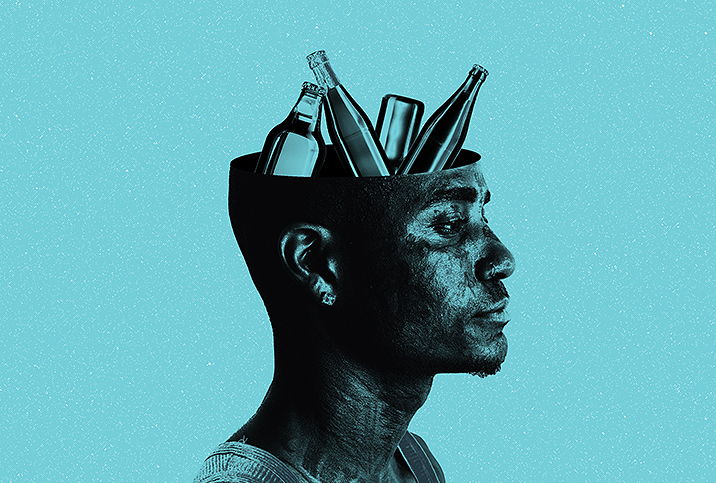Innovations and Impediments in the Fight Against Substance Use

Addiction affects a vast spectrum of the American population. There are so many shocking statistics about substance use that it feels almost impossible to pick out one or two to make the point, but consider: More than 70,000 drug overdose deaths occur in the United States annually, a number that rises by 4 percent every year.
Many adults and young people have primary or secondary experiences with substance use, so the condition should not be regarded as a weakness or an undefined frailty in a small subset of our nation. In some ways, chemical dependence is a way of life for many Americans. We rely heavily on prescribed and over-the-counter medicines to overcome chronic illnesses, pain, disease and other problems we encounter. Many Americans think of relaxation synonymously with alcohol, tobacco or recreational drug use.
With that irrepressible truth exposed in media and national health statistics, we have adapted a new framework of how to view addiction. The battle is being fought by caseworkers, advocates, therapists, doctors and specialists of all kinds around the country. Arguably, we may be emerging into a gentler and more flexible era of care surrounding addiction recovery.
However, it's safe to say reality is beyond the horizon, if not still in the stars.
Anyone can be an addict
TJ King, an outreach coordinator in Lincoln, Nebraska, with the Nebraska AIDS Project, has seen substance use problems from every angle, inside and out.
"I do outreach at CenterPointe and that is with people that are living with or have been affected by addiction," King said. "I suffered with addiction for quite a while until I got my s**t together and realized that I was sick and tired of being sick and tired.
"It could be any one of us," he continued. "We are one sprained knee or one instance of lower back pain away from, you know, being addicted. I think that people forget that it could be anybody."
While addiction doesn't necessarily happen overnight, King's point is a salient one. A bad day, or a series of bad days, can be part of the recipe, which slow-cooks substance use into abuse.
As science has advanced, and as human beings have generally gotten better at making things and disseminating information, substances have become more prevalent, accessible and pedestrian; not to mention the capital component of what critics call the medical-industrial complex.
"Let's face it, 'Big Pharma' is in the market of making money," King noted. "And, for the longest time, the quickest and easiest remedy for any of us to get over an ailment was for somebody to go to the prescription pad and write a prescription. I think that there's a new face to addiction. It's affecting everybody, and people can no longer just say it is 'their' disease or it's only 'those people' who get it, because it's an everybody thing, and Big Pharma is laughing all the way to the bank with that."
While the pharmaceutical industry has been threatened with legal action in recent years for its part in the national substance use epidemic, it's important to remember there are more players in the game than the titans of the medicinal industries.
Drugs and alcohol are still rampant problems in streets, bars, nightclubs, homes, hotels, workplaces and just about every in-between place you can imagine. Even people who have never swallowed a pill in their life can be prone to addiction.
Treating addiction as trauma
Many people may intuitively agree trauma and addiction go hand in hand—without really knowing why.
"I like this question, this topic, because I'm used to talking normally about how trauma causes addiction, but we don't as much talk about how addiction causes trauma," said Karol Darsa, Psy. D., a licensed psychologist who literally wrote the book on trauma mapping ("The Trauma Map") and owns a trauma treatment center in Los Angeles.
"I often see addiction also as abuse," Darsa added. "It's an abuse of the self. And, many times, it can be an abuse of others. You're basically either abusing your body, you're abusing your soul, you're abusing yourself by putting something in your body that is really not only unhealthy but it causes you to behave a certain way, it causes you to become dependent, so it's a sort of constant self-punishment."
The connection between trauma and addiction is nothing new, but it is important, in medical contexts and administrative spaces, to talk about addiction as being traumatic in its own right. As long as we fail to see the addict as a victim or recipient of their own behavior, we make it difficult to offer help in a meaningful or lasting way.
The scales of progress and procrastination
Anyone can be an addict, and addiction can be inherently traumatic. These two concepts are at the core of our most evolved attitudes toward treating addiction.
Sometimes, however, the more names we put to a phenomenon, the more we estrange people from relating to it. While viewing addiction as an ever-present disease capable of becoming traumatic opens the door for new treatment methods and forms of study, the same concepts can scare away those people who need to hear them most.
Dealing with one trauma often means attempting to resolve older experiences you've forgotten about or that you didn't even know were there. The substance abuse recovery process often involves similar work. Understanding addiction as traumatic may open the door to recovery, but it can also open the door to a whole lot of skeletons and demons you'd rather not confront.
This is why it's important to have support, whether it's from a doctor, counselor, case manager, outreach coordinator, friend or family member. Sometimes all it takes is one encouraging voice amid the chaos to help you take the right step toward your own recovery.
The current stride is toward creating more spaces where people can find those voices. Professional, academic and social efforts are expanding and improving upon definitions to try to make room for everybody to create the healing space they need.
"Wherever there is abuse, there is trauma, so that's sort of how I am seeing it," Darsa explained. "Again, it's self-inflicted trauma. And, of course, it's no accident that people who are traumatized become addicts, because from what I've seen over the years, people who are abused tend to abuse themselves. People are more used to saying that people who have been abused, abuse others, that's true, but what I'm really working with is how they abuse themselves. And addiction falls into one of those categories."




















